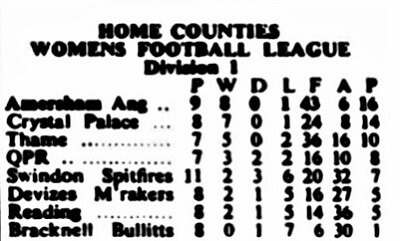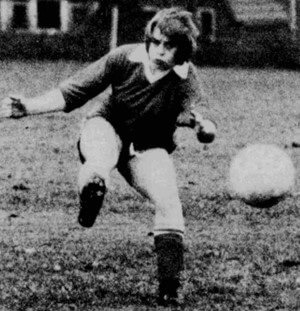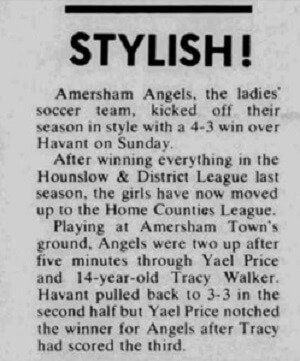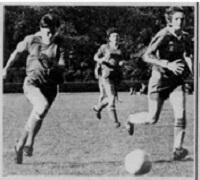The town’s pioneering women footballers
by Alison Bailey
Anyone following the fantastic Women’s World Cup coverage in 2023, and the Lionesses progress through the tournament, could not fail to be astounded by the remarkable fact that women were effectively banned from playing football in England for 50 years. In 1921, the Football Associated reinforced an earlier ban by prohibiting women from playing on Association pitches, stating that: “The game of football is quite unsuitable for women and should not be encouraged”. This ban was not lifted until 1971.
Despite the 1975 Sex Discrimination Act, which included a clause exempting sports, the FA did not incorporate the women’s game until 1993, which makes the Lionesses achievements even more extraordinary.
In 1968 a women’s football team, Amersham Angels was established which was very successful both nationally and internationally.
Early years of Women’s Football
In 1894, 31 years after the formation of the FA in 1863, keen footballer Nettie Honeyball founded the British Ladies’ Football Club in London. “There is no reason why football should not be played by women, and played well too, provided they dress rationally and relegate to limbo the straitjacket attire in which fashion delights to attire them,” Lady Florence Dixie, a suffragist and advocate of women’s rights who was President of the club, wrote in a letter to the Pall Mall Gazette. The British Ladies’ Football Club’s ‘North’ and ‘South’ teams toured the country giving exhibition matches watched by thousands of people curious to see women playing football. When the women played in Chesham in September 1895, they were watched by a record crowd. This first attempt at establishing a women’s game was short lived however, due to organisational issues.
It was during WWI, when the Football League suspended all matches at the end of the 1914-15 season, that women’s football really took off. Teams of factory girls, particularly in the munitions factories, began to play against each other, initially in novelty events to raise funds for the war effort. By September 1917, 14 teams had registered for the Munition Girls’ Challenge Cup. The Cup final at Ayresome Park drew 22,000 spectators, with the money raised continuing to go towards the war effort. Certain teams became famous such as Dagenham’s Sterling Invincibles and Preston’s Dick, Kerr’s Ladies (named for the factories where the women worked). Both regularly appeared on Pathé newsreels and the Dick, Kerr Ladies toured France.
Even after the war ended in 1919 and men returned home, women’s football continued to be immensely popular. Crowds attended matches in their thousands, while charities competed for the favour of top teams. In 1920, the Dick, Kerr’s Ladies played 30 games – more than any professional men’s team played in the same period. When Dick Kerr’s Ladies played St Helen’s Ladies on Boxing Day 1920, they pulled in a crowd of 53,000 at Everton’s Goodison Park ground, with thousands more fans locked outside.
The 1921 ban dealt a serious blow to the game. The English Ladies’ Football Association was formed but it was strictly amateur and run by volunteers. While the Dick, Kerr Ladies and others played on, the effect of the ban was devastating because it took away the crowds and the opportunity to earn money. Teams were forced into parks and friendly rugby clubs, but the stadium capacity offered by the men’s game could not be matched. Without the opportunity for large crowds to watch games interest in the women’s game was lost.
Amersham Angels
Organised football first came to Amersham when the Amersham Town Football Club was founded in 1890. However, unlike Chesham, the town had to wait nearly 80 years for a women’s team. England’s 1966 World Cup victory inspired huge interest in the game across the country. In 1968, 21-year-old Linda Debenham suggested starting a ladies’ football team to her dad, Joe Debenham whilst they were watching Harefield United’s men play. Amersham Angels was born and became a true family affair. Joe managed the team from his house at 38 Plantation Road with his wife Pam, as secretary, treasurer and “general dog’s-body”. Linda was the first captain and younger sister, June, a talented dancer, became a leading striker for the team. Linda’s husband, Pat Boyle, later managed the team for a period when his father-in-law was seriously ill. Boyle had played for Wycombe Wanderers and Chesham United and was a scout for Wolves. Pat and Ted Collom supported the Debenhams with Ted acting as assistant manager.
The team was part of the new national enthusiasm for women’s football which led to the formation of the Women’s Football Association in 1969, with a more formal structure of leagues and competitions. Although, unlike the FA, this was still a voluntary-led organisation with limited resources.
Hervines Park was hired by Joe for training and home matches. However, this was unplayable in poor weather and meant many home matches had to be cancelled. He later complained that the team had little support from the town, and that he had to spend 100s of pounds of his own money to get the team started.
One of the most successful teams in the country

Despite their rather dubious name, which lead to such obvious headlines as “Just heavenly Angels”, “Angels’ Delight” and “High Flying Angels”, the new team took themselves seriously, joining the Women’s Southern Area Football League. The first match at Hervines Park in October was against Watford Women’s team and raised funds for St John’s Ambulance with a crowd of around 200. The Angels played in red shirts and white shorts, probably because Joe was a committed Arsenal fan! Within a year Joe was managing two teams with a junior team, the Amersham Imps and around 30 young women on the books.
In 1969 the team played a friendly against England and hosted the Czech team, Rapid Jihlava, later visiting them in Czechoslovakia. International tournaments in Mallorca and Holland followed with the Angels regularly winning cups and promotions. 1973 was a particularly successful year for the Angels with them winning the Home Counties League Championship and taking third place in the National Mitre Challenge Trophy (the women’s FA Cup) beating Birmingham City 1-0 in the play-off. They were also one of three teams with Southampton and Birmingham, chosen to play the Swedish National side when it toured England. This match was played at Chesham’s Meadow football ground. They also appeared on TV’s Saturday lunchtime programme World of Sport in March 1973. The programme featured an interview with Joe and footage from the Angels’ 3-0 defeat of Fulham Ladies. In 1978 they achieved a double, as champions of the Hounslow and District Ladies Football League and the League cup winners. In 1980 they were promoted to the Home Counties League Division One as champions of Division Two with a 13-0 win against Bracknell Bullets.
Lioness Sandra Choat

In 1975 three Amersham Angels were chosen to trial for England, June Debenham, Nicola Coe and Pat Norris. They were hoping to follow in the footsteps of former teammate, Sandra Choat. Sandra first joined the club when she was 15 travelling to training and home games from Woking in Surrey. She became one of the teams most prolific scorers before moving to QPR Ladies in 1974. She made her England debut against France that same year. She had 5 caps and scored 4 goals including a hat trick against Switzerland in 1975 before an ankle injury ended her England career. In 1977 she won the WFA Cup Final with QPR. She later returned to Amersham Angels for a couple of seasons. During her career she scored 406 goals in 360 matches and for a time held the record for the most goals scored in one game, 14 in the QPR v Watford, Watford Cup match.
In an interview for a book on the history of WFA, Sandra described the facilities that women had to put up with in the 1970s. “I remember a QPR team-mate doing last minute preparations by clearing horse dung off the pitch before our match at Totton. Watford’s changing facilities at Kings Langley left a lot to be desired with the showers not to be braved without a tetanus injection. Buckets were the order of the day for more basic needs. Health & Safety today would have a field day”. She also remembered her time at Amersham, “Amersham’s manager, Joe Debenham, had a fruit and veg van. He would drive around his local area selling his produce. On a Saturday evening he would clear out all the produce and most of the waste (but not the smells) and convert it with benches into our ‘football coach’ for our long away trips. We would pile in our kit bags and ourselves, chugging up the motorway at 40 mph, billowing out thick smoke. Can you see this happening today?”
In November 2022, Choat was recognized by the FA as one of the national team’s legacy players, and as the 20th women’s player to be capped by England.
Press Coverage

Lack of basic facilities was probably not the worst thing that women footballers had to endure during the 1970s. Whilst the Angels received extensive coverage in the local press which helped raise their profile and attract supporters, some of the reporting was incredibly sexist. As well as being described as “the area’s loveliest football team”, one sports reporter wrote in 1971, “Amersham Angels – the nearest thing to women’s liberation in the area? Not a bit of it. Amersham’s high flying lady footballers love the game – and they still manage to stay in favour with their boyfriends”. Things hadn’t improved by 1978 when Stephen Constable wrote, “Ladies’ football has shaken off the giggle-in-hot-pants image these days, and there are many men who would envy the skills and stamina of players like Angels’ skipper Pat “Pud” Norris. Amersham Angels are not all life members of the St Trinian’s Old Girls Association, nor are they butch, back-slapping Brunhildes, but they can be tough cookies sometimes”.
The end

The team stopped playing in the 80s although the reasons for this were not documented in the local press. At the end of 1979, after constant fundraising events, the Angels claimed to be one of the wealthiest women’s clubs in the country with several thousands of pounds invested and two minibuses of their own which meant that they no longer had to travel in Joe’s fruit and veg van! In 1980 Joe tried to acquire playing fields on White Lion Road which the landowner wanted to develop but could not raise the £7000 demanded and this lack of playing facilities would have been a major factor in the club’s demise. In the 90s former players took part in charity matches including a six-a-side match against the Arsenal Celeb-etts. The last mention of the Angels was in 1993 when 80 former players met for an emotional reunion at Watford Town Cricket Club to pay tribute to Pat Debenham who had died that summer.
Legacy
Whilst the nation’s dreams of lifting the World Cup were dashed on Sunday 20 August 2023, when Sarina Wiegman’s European champions lost 1-0 to Spain, the Lionesses’ place in the history books is assured. It is time to remember the early women’s teams that made their achievements possible, and to ensure the further advance of women’s football. After a tough 4-4 draw against Southampton Ladies, the country’s leading team, Joe Debenham was particularly pleased with the Angels and declared to the press, “I think Amersham as a town should be proud of these girls”. So do I! I would love to hear from any former Angels or anyone with any information about the team. Please get in touch at inf[email protected].
Sources
How the FA banned women’s football in 1921 and tried to justify it | Women’s football | The Guardian
The secret history of women’s football – BBC News
British Newspaper Archive
Neil Rees
The History of Women’s Football, Jean Williams

